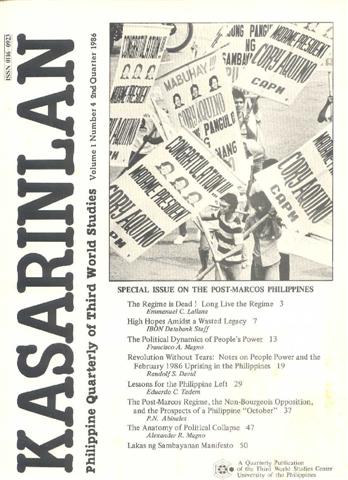Lessons for the Philippine Left
Abstract
Once at the forefront during the greater part of Marcos’ autocratic reign, this paper examines how the initial decision of non-participation by the Left eventually led to their marginalization within the broad anti-fascist movement. Taking into account the historical circumstances, it argues that the left grossly misjudged the overall political climate and underestimated the level of militancy of the masses in the 1986 snap elections. Acceptance of the boycott policy created fissures within the group. Eventually, the BAYAN-led Left, the only ones who subscribed to the hard-line policy, found themselves isolated from the popular activities before and after the electoral campaigns. Realizing their miscalculations based on the momentum the “parliament of the streets” was gaining, attempts were made to once again be involved. However, all efforts were to no avail. This shift in gears by BAYAN conveyed the image of inconsistency and thus resulted to a credibility gap. Presently, BAYAN has to deal with two main issues. First, it must overcome the mistrust that Cory’s supporters harbor against them. Second, they are left with the decision of whether it should temporarily set aside the major issue of US imperialism in order to help complete the democratic revolution. In the final analysis, unity of all democratic forces is essential if the gains of the anti-fascist struggle are to be preserved and consolidated. Dominant Left groups must make significant shifts in policy and strategy in tune with the changing times, if they are to remain major factor in the newly unfolding process of socio-economic change.
Published
2007-11-20
Issue
Section
Features
Keywords
left, 1986 snap elections, BAYAN, US imperialism, anti-fascist struggle, parliament of the streets
By submitting a manuscript, the authors agree that the exclusive rights to reproduce and distribute the article have been given to the Third World Studies Center.



